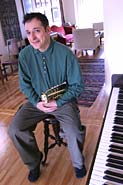Philosophy, art and improvisation
Philosophy, art and improvisation McGill University
User Tools (skip):
Philosophy, art and improvisation
Few philosophers can claim that attending concerts and musical jam sessions are all in a day's work. Philosophy professor Eric Lewis is an exception. As a resolution made for his 40th birthday, Lewis decided to once again take up the trumpet, this time in the name of research.

Philosophy professor and trumpeter Eric Lewis
Owen Egan
Lewis studies improvised music and the challenges it poses to traditional theories of aesthetics. In his work, he attempts to meld the artistic and academic communities to enhance an understanding of improvised arts. As part of this project, Lewis has also become a musician, taking weekly trumpet lessons and attending evening sessions with members of Montreal's flourishing improvised music scene.
How exactly does one begin in ancient Greek philosophy and end up in improvised arts? According to the trumpet-touting professor, the only thing linking the two is curiosity. Lewis began teaching at McGill in 1991 with a background in ancient chemistry, pre-Socratic philosophy and mereology - the study of a whole and its parts. In 2001 he changed his focus and started teaching courses on Afrological music (jazz, blues, gospel, funk and spirituals) and improvisation.
Improvised music is often described as a form of dialogue, wherein one musician is communicating with another via instruments. It is during this conversation that identity is negotiated and communities are formed, said Lewis. For some marginalized groups, improvised music acts as a means to preserve memory and assert rights. He cited the recent film Amandala!, which documented the central role of music in the South African anti-apartheid struggle.
Lewis also founded the Project on Improvisation (PI), which promotes improvisation in the arts through concerts, panel discussions, exhibits, screenings and public performances. Another one of his innovations has been the university varsity ultimate Frisbee team.
A long-time fan of jazz, Lewis pondered the idea of combining his musical passion with his academic pursuits in philosophy for years. "I was worried that my fun would become work and it wouldn't be fun anymore," he said.
Fortunately, no joy has been lost along the way. Instead, Lewis has had the opportunity to collaborate with numerous scholars and artists working to challenge and change the way we look at improvised arts. He recognized early on that most Western notions of aesthetics fall short when it comes to improvised music. "Improvised music has probably been the dominant form of music-making since people began making music; it brings with it its own questions and plausible answers to these questions," Lewis explained. "It is an antidote to the dominant discourses concerning the philosophy of music."
Much of the current scholarship addresses this shortcoming by drawing upon fields of post colonial, feminist and African-American literary theories and cultural studies. According to Lewis, such theories tend to locate the artist in his or her appropriate socio-political context, unlike traditional aesthetics, which isolate the artwork from its creator.
Lewis's informal education on improvisation began as a teenager, when he would spend his evenings listening to live music at saxophonist Sam River's loft on the Lower East Side of New York City, where Lewis grew up. Unbeknownst to Lewis at the time, the location was quickly becoming world famous for avant-garde jazz, with New York at the height of '60s and '70s innovations. It was perhaps this vibrant early experience that led Lewis to become somewhat of a self-described Luddite. To this day, he has nothing but disdain for the compact disc, opting instead for vinyl for its superior sound quality. "I don't like them; I think they are witchcraft," he said, laughing. Admittedly, this habit makes it more difficult to support living artists.
Lewis is part of an international network of scholars dedicated to studying the relationship between political and social discourse and improvised arts. "There are a number of us who believe that improvisation is an act of experimenting with new political structures and new forms of political dialogue," he said. He suggested the process of improvisation can provide lessons in how to develop a model of inclusive and flexible politics.
Along with University of Guelph professor Ajay Heble, George Lewis of Columbia University, Georgina Born of the University of Cambridge and George Lipsitz from the University of California at San Diego, Lewis will be launching an online journal, Critical Studies in Improvisation, this fall. The group also hopes to embark on a larger, multi-disciplinary research project through the Major Collaborative Research Initiatives, a program sponsored by the federal government.
For those of you with a penchant for improvisation in the arts, Lewis is organizing a conference, to be held from May 26 to 30, entitled "New Perspectives on Improvisation," which will explore politics, conceptions of gender, human rights and artistic freedom through a series of lectures coupled with live performances.
For more information, visit www.mcgill.ca/improv.
